
This is a directory of properties and districts listed on the National Register of Historic Places in Arizona. There are about fourteen hundred listed sites in the state, and each of its fifteen counties has at least ten listings on the National Register. Forty-seven of the state's sites are further designated as National Historic Landmarks.
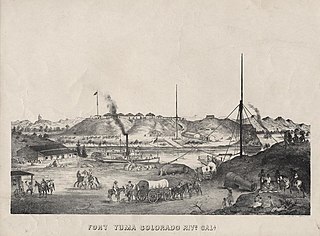
Fort Yuma was a fort in California located in Imperial County, across the Colorado River from Yuma, Arizona. It was on the Butterfield Overland Mail route from 1858 until 1861 and was abandoned May 16, 1883, and transferred to the Department of the Interior. The Fort Yuma Indian School and the Saint Thomas Yuma Indian Mission now occupy the site. It is one of the "associated sites" listed as Yuma Crossing and Associated Sites on the National Register of Historic Places in the Yuma Crossing National Heritage Area. In addition, it is registered as California Historical Landmark #806.

Tombstone Courthouse State Historic Park is a state park of Arizona in the United States. Located in Tombstone, the park preserves the original Cochise County courthouse. The two-story building, constructed in 1882 in the Victorian style, is laid out in the shape of a cross and once contained various county offices, including those of the sheriff, recorder, treasurer, and the Board of Supervisors as well as courtrooms and a jail. Inside, the courthouse contains a museum with numerous artifacts from the town's history while outside, a replica gallows has been constructed in the courtyard to mark the spot where seven men were hanged for various crimes. The park was one of the first to be designated as a state park and in 1959 was the first to open following the 1957 establishment of the Arizona State Parks Board.

Yuma Crossing is a site in Arizona and California that is significant for its association with transportation and communication across the Colorado River. It connected New Spain and Las Californias in the Spanish Colonial period in and also during the Western expansion of the United States. Features of the Arizona side include the Yuma Quartermaster Depot and Yuma Territorial Prison. Features on the California Side include Fort Yuma, which protected the area from 1850 to 1885.
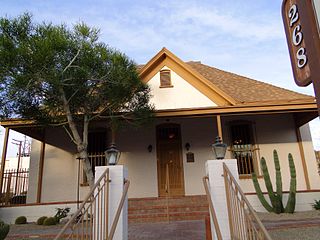
The Brown House is a 19th-century house in Yuma, Arizona, built of brick in the 1890s.

Yuma Quartermaster Depot State Historic Park, formerly Yuma Crossing State Historic Park, and now one of the Yuma Crossing and Associated Sites on the National Register of Historic Places in the Yuma Crossing National Heritage Area. It is an Arizona state park in the city of Yuma, Arizona, US.

Pima County Courthouse is the former main county courthouse building in downtown Tucson, Arizona. It is listed on the National Register of Historic Places. It was designed by Roy Place in 1928 in Mission Revival and Spanish Colonial Revival style architecture.

This is a list of the National Register of Historic Places listings in Yuma County, Arizona. It is intended to be a complete list of the properties and districts on the National Register of Historic Places in Yuma County, Arizona, United States. The locations of National Register properties and districts for which the latitude and longitude coordinates are included below, may be seen in a map.
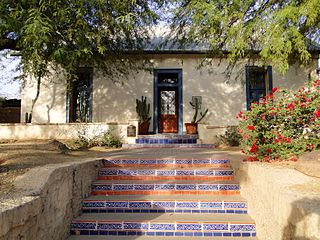
Ortiz House in Yuma, Arizona was built in 1901. It was listed on the National Register of Historic Places in 1982.

The Southern Pacific Railroad Depot in Yuma, Arizona, was built as a Spanish Colonial Revival-style station by the Southern Pacific Railroad in 1926.
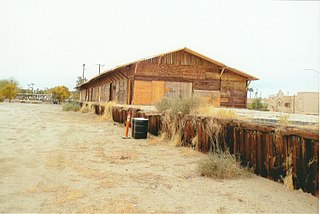
Southern Pacific Freight Depot in Yuma, Arizona was built in 1891, built with redwood shiplap and in the wooden Stick—Eastlake architectural motifs of the Victorian Queen Anne Style.

The current Graham County Courthouse is a courthouse located at 800 W. Main St. in Safford, Arizona that is listed on the National Register of Historic Places. It is a two-story red brick building above a concrete foundation that includes a raised basement. The main part of the east-facing building is 83 feet (25 m) by 62 feet (19 m), and there is a one-story 17 feet (5.2 m) by 49 feet (15 m) north wing made of brick, and a small ell in the back.

The Masonic Temple in Yuma, Arizona was built in 1931 in the late Art Deco style of Moderne. It was designed by Los Angeles-based architects Edward Gray Taylor and Ellis Wing Taylor. In 1933, at the depth of the Great Depression, the Masonic lodge lost all its funds in a bank closure. On November 16, 1933, the building's ownership was turned over to the Pacific Mutual Life Insurance Company "in satisfaction of a $16,900 realty mortgage." It was later rented back to the Masonic chapter and on May 10, 1940, ownership was restored.
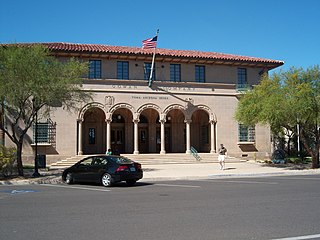
The U.S. Post Office—Yuma Main, also known as Yuma Main Post Office or Yuma Downtown Postal Annex, is the former main post office serving Yuma, Arizona. The post office was constructed in 1933. The building's design, a work of architect Roy Place, is a blend of the Beaux Arts and Spanish Colonial Revival styles. The design includes a loggia supported by Corinthian columns, wrought iron railings and window bars, a molded belt course between the building's two stories, a projecting bracketed cornice, and a red tile roof. The post office was built toward the end of the Beaux-Arts phase of federal building design, as government architects shifted to a "starved classicism" style in the ensuing years.

The Courthouse Plaza Historic District is a historic district in Prescott, Arizona that was listed on the U.S. National Register of Historic Places (NRHP) in 1978.
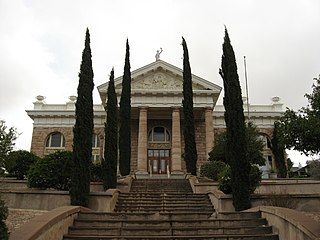
The Santa Cruz County Courthouse in Nogales, Arizona was built in 1903. It is a Classical Revival style building. It was listed on the National Register of Historic Places in 1977.
Gustav A. Hanssen was an American architect. He designed private residences in Davenport, Iowa and later moved to San Diego, California. Several of his buildings are listed on the National Register of Historic Places (NRHP).

















